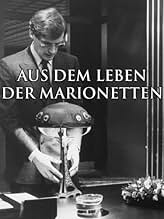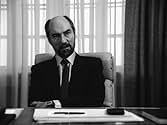CALIFICACIÓN DE IMDb
7.2/10
5 k
TU CALIFICACIÓN
Un recuento de eventos antes y después de un homicidio cometido por un hombre de negocios perturbado en un tenso matrimonio, y qué lo motivó a cometer ese acto atroz.Un recuento de eventos antes y después de un homicidio cometido por un hombre de negocios perturbado en un tenso matrimonio, y qué lo motivó a cometer ese acto atroz.Un recuento de eventos antes y después de un homicidio cometido por un hombre de negocios perturbado en un tenso matrimonio, y qué lo motivó a cometer ese acto atroz.
- Premios
- 1 premio ganado en total
Paul Bürks
- The Assistant in the fashion show
- (sin créditos)
- Dirección
- Guionista
- Todo el elenco y el equipo
- Producción, taquilla y más en IMDbPro
Opiniones destacadas
Bergman's working with a very restricted palette here, as he did with The Rite or Winter Light. The romantic, funny touches you expect from him are missing. Peter's mind is crumbling; he's a modern Othello obsessed with his wife's fidelity amid the tasteful furniture of their elegant home. All the action is seen through the distorting lens of Peter's madness. Why would his wife say, in front of strangers, that she has to get drunk to steady her nerves at her mother-in-law's place? This is the disturbed mind at work.
The acting is fine. Robert Atzorn and Walter Schmidinger do very well as, essentially, two sides of the same coin (the stodgy businessman and the gay fashion designer). Christina Buchegger is wonderful as Katharina, the wife; her attempts to win out over Peter's psychosis give the film what drama it has.
The acting is fine. Robert Atzorn and Walter Schmidinger do very well as, essentially, two sides of the same coin (the stodgy businessman and the gay fashion designer). Christina Buchegger is wonderful as Katharina, the wife; her attempts to win out over Peter's psychosis give the film what drama it has.
Pros:
1. The movie begins with an eye-catching opening which is simultaneously tense, suspenseful, and unflinchingly brutal. It also serves as an intriguing view into the main character.
2. The flashbacks are presented with a black-and-white colour palette, which is just a nice and simple way of delineating them from the present.
3. Both Robert Atzorn (Peter Egermann) and Christine Buchegger (Katarina Egermann) deliver fantastic performances.
4. The film serves as a fascinating insight into the mind of a psychopath who also happens to be suffering from marriage and sex issues.
5. The cinematography, especially in regards to the framing of the shots, is sharp and concise.
Cons: 1. The sound design is a little off at times. 2. The continuous sex, and sex-related content, starts to get a little repetitive. 3. The movie, at times, feels too pretentious which pulls the viewer out of the immersion.
Cons: 1. The sound design is a little off at times. 2. The continuous sex, and sex-related content, starts to get a little repetitive. 3. The movie, at times, feels too pretentious which pulls the viewer out of the immersion.
A complex dissection of a murder and a murderer, told by jumping back and forth in time, before and after the event, A deeply disturbing portrait of a man and a society so cut off from feeling that violence seems almost inevitable.
While more divided in public reaction then some of Bergman's most beloved works, I think this edgy, bold, uncomfortable film ranks close to some of his best work. While there are moments of pretension, there's also a lot of human and psychological complexity (and wonderful acting) in this bleak exploration of how near murder and madness lie to any of us.
While more divided in public reaction then some of Bergman's most beloved works, I think this edgy, bold, uncomfortable film ranks close to some of his best work. While there are moments of pretension, there's also a lot of human and psychological complexity (and wonderful acting) in this bleak exploration of how near murder and madness lie to any of us.
Bergman made this film in Germany, while in exile from Sweden for tax-related reasons. It's a dark and disturbing psychological portrait of a man, Peter, who murders a prostitute in the opening scene. The film moves back and forth in time, using title cards to establish the setting in time, trying to explain Peter's troubles. It's reminiscent of Scenes from a Marriage, as Peter has problems relating to his wife, Katarina. A few weeks before the murder, he started having fantasies and dreams about murdering her. The prologue, depicting the murder (or, more precisely, the moments before the murder) and the epilogue (Peter in prison) are filmed in color, but everything else is in black and white. The composition is generally not showy, but there is an amazingly filmed dream sequence, the film's centerpiece. The script is generally brilliant, very observant. The only thing I felt was a little underdeveloped was the homosexual character, Tim, and Peter's supposed latent homosexuality, which the psychoanalyst character describes near the end. I wasn't quite sure what to make of that material. 9/10.
Ingmar Bergman's From the Life of the Marionettes, his last film done while in exile during the late 70's, hearkens back to his experimental period in the mid to late 60's. Here he's trying for a deconstructive way to get inside the mind of his subjects, most notably the character of Peter Egermann. The fatal flaw of the film, however, is also something that adds an unusual kind of connection to the material for a Bergman film. It's erratic in its narrative as the director tests himself with jumping around from different times around a single event. But unlike how this has been done by the likes of Tarantino, this is meant not really as a useful story trick, but to try to get different perspectives and acute angles of the subject at hand. The film doesn't reach its greatness for the same reason that it does keep itself watchable- this is very murky, depressing times, loaded with dialog that may or may not go ways to help explain or give some interest in the supporting/main characters, and some startling, if dated, surreal experiences.
It's also a little strange that Bergman decided to connect these characters, however loosely, to the couple in the first episode of the Scenes From a Marriage series, where Peter and Katarina (then played by Jan Maljsmo and Bibi Andersson) were the volatile arguers who juxtaposed the main focus of the film. Here, portrayed by Robert Atzorn and Christine Buchegger, are not only not as spot-on as the former actors (though they are still quite good and splendid in some scenes), the couple is picked under Bergman's psychological microscope where the relationship is very strained and a fatalistic. The opening scene is definitely a mind-blower, with an intensity and harsh sexual edge that is uncommon to Bergman's films (one of his best openings to be sure). Indeed, one of the nice twists, a little shocking at first and then intriguing, is how the filmmaker lets out inhibitions and shows the more explicit images of nudity and the sensual, as well as rock and disco music.
Along with a fragmented approach to the storytelling, where infidelities, insecurities, shame, depression, and outright rage and confusion are brought out in segments that range from the convincing to missing the mark. In a way, maybe Bergman's aims are lowered this time in exile, and he delves more into a doomed personality with visual surprise. Sven Nyvkist, as usual, is still very good with what he does in the frame, especially as this is 90% black and white (with a strange blue tint at times), and his services come into great use in a visual detailing of a dream involving Peter and Katarina naked in a wide, white space. It's maybe the best sequence in the film. In experimenting with the dramatic interpretations, it's not as successful, and some of the supporting actors aren't as good as the leads (a scene with one of the actors talking into a mirror is one of my least favorite scenes Bergman's ever wrote/directed).
Its obscurity is not, therefore, that staggering to see. But it is a good and occasionally spine-tingling character study, and if you are into the filmmaker's work already it's a find that might prove better or more fulfilling. 7.5/10
It's also a little strange that Bergman decided to connect these characters, however loosely, to the couple in the first episode of the Scenes From a Marriage series, where Peter and Katarina (then played by Jan Maljsmo and Bibi Andersson) were the volatile arguers who juxtaposed the main focus of the film. Here, portrayed by Robert Atzorn and Christine Buchegger, are not only not as spot-on as the former actors (though they are still quite good and splendid in some scenes), the couple is picked under Bergman's psychological microscope where the relationship is very strained and a fatalistic. The opening scene is definitely a mind-blower, with an intensity and harsh sexual edge that is uncommon to Bergman's films (one of his best openings to be sure). Indeed, one of the nice twists, a little shocking at first and then intriguing, is how the filmmaker lets out inhibitions and shows the more explicit images of nudity and the sensual, as well as rock and disco music.
Along with a fragmented approach to the storytelling, where infidelities, insecurities, shame, depression, and outright rage and confusion are brought out in segments that range from the convincing to missing the mark. In a way, maybe Bergman's aims are lowered this time in exile, and he delves more into a doomed personality with visual surprise. Sven Nyvkist, as usual, is still very good with what he does in the frame, especially as this is 90% black and white (with a strange blue tint at times), and his services come into great use in a visual detailing of a dream involving Peter and Katarina naked in a wide, white space. It's maybe the best sequence in the film. In experimenting with the dramatic interpretations, it's not as successful, and some of the supporting actors aren't as good as the leads (a scene with one of the actors talking into a mirror is one of my least favorite scenes Bergman's ever wrote/directed).
Its obscurity is not, therefore, that staggering to see. But it is a good and occasionally spine-tingling character study, and if you are into the filmmaker's work already it's a find that might prove better or more fulfilling. 7.5/10
¿Sabías que…?
- TriviaDe la vida de las marionetas (1980) is Director Ingmar Bergman's only movie shot in the German language. El huevo de la serpiente (1977) was shot in Germany, too, but mostly in English.
- ConexionesFeatured in Drugoe Kino: From the Life of the Marionettes (2006)
- Bandas sonorasTouch Me, Take Me
Performed by Rita Wright
Selecciones populares
Inicia sesión para calificar y agrega a la lista de videos para obtener recomendaciones personalizadas
Detalles
- Fecha de lanzamiento
- Países de origen
- Idioma
- También se conoce como
- From the Life of the Marionettes
- Locaciones de filmación
- Productoras
- Ver más créditos de la compañía en IMDbPro
Taquilla
- Total a nivel mundial
- USD 4,293
- Tiempo de ejecución
- 1h 44min(104 min)
- Color
- Mezcla de sonido
Contribuir a esta página
Sugiere una edición o agrega el contenido que falta





























